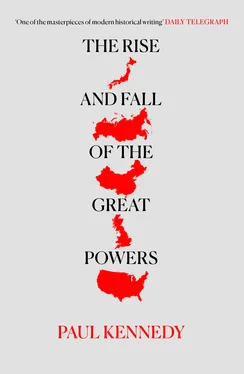One quite vital factor in Frederick William’s submission at Oelmuetz had been the knowledge that the Russian czar supported Austria’s case in the ‘German question’. Throughout the entire period from 1812 until 1871, in fact, Berlin took pains to avoid provoking the military colossus to the east. Ideological and dynastic reasons certainly helped to justify such obsequiousness, but they did not fully conceal Prussia’s continued sense of inferiority, which the Russian acquisition of most of Congress Poland in 1814 had simply accentuated. Expressions of disapproval by St Petersburg over any moves toward liberalization in Prussia, Czar Nicholas I’s well-known conviction that German unification was utopian nonsense (especially if it was to come about, as was attempted in 1848, by a radical Frankfurt assembly offering an emperor’s crown to the Prussian king!), and Russia’s support of Austria before Oelmuetz were all manifestations of this overshadowing foreign influence. It was scarcely surprising, therefore, that the outbreak of the Crimean War in 1854 found the Prussian government desperately eager to stay neutral, fearing the consequences of going to war against Russia even while it worried at losing the respect of Austria and the western powers. Given its circumstances, Prussia’s position was logical, but, because the British and Austrians disliked Berlin’s ‘wavering’ policy, Prussian diplomats were not allowed to join the other delegates at the Congress of Paris (1856) until some way into the proceedings. Symbolically, then, it was still being treated as a marginal participant.
In other areas, too – although less persistently – Prussia found itself constrained by foreign powers. Palmerston’s denunciations of the Prussian army’s move into Schleswig-Holstein in 1848 was the least worrying. Much more disturbing was the potential French threat to the Rhineland, in 1830, again in 1840, and finally in the 1860s. All those periods of tension merely confirmed what the quarrels with Vienna and occasional growls from St Petersburg already suggested: that Prussia in the first half of the nineteenth century was the least of the Great Powers, disadvantaged by geography, overshadowed by powerful neighbours, distracted by internal and inner-German problems, and quite incapable of playing a larger role in international affairs. This seems, perhaps, too harsh a judgement in the light of Prussia’s various strengths: its educational system, from the parish schools to the universities, was second to none in Europe; its administrative system was reasonably efficient; and its army and its formidable general staff were early in studying reforms in both tactics and strategy, especially in the military implications of ‘railways and rifles’. 39 But the point was that this potential could not be utilized until the internal-political crisis between liberals and conservatives was overcome, until there was firm leadership at the top, in place of Frederick William IV’s vacillations, and until Prussia’s industrial base had been developed. Only after 1860, therefore, could the Hohenzollern state emerge from its near-second-class status.
Yet, as with many other things in life, strategical weakness is relative; and, compared with the Habsburg Empire to the south, Prussia’s problems were perhaps not so daunting. If the period 1648–1815 had seen the empire ‘rising’ and ‘asserting itself’, 40 that expansion had not eliminated the difficulties under which Vienna laboured as it strove to carry out a Great Power role. On the contrary, the settlement of 1815 compounded these difficulties, at least in the longer term. For example, the very fact that the Austrians had fought so frequently against Napoleon and emerged on the winning side meant that they required ‘compensations’ in the general shuffling of boundaries which occurred during the negotiations of 1814–15; and although the Habsburgs wisely agreed to withdraw from the southern Netherlands, southwestern Germany (the Vorlande), and parts of Poland, this was balanced by their large-scale expansion in Italy and by the assertion of their leading role in the newly created German Federation.
Конец ознакомительного фрагмента.
Текст предоставлен ООО «ЛитРес».
Прочитайте эту книгу целиком, купив полную легальную версию на ЛитРес.
Безопасно оплатить книгу можно банковской картой Visa, MasterCard, Maestro, со счета мобильного телефона, с платежного терминала, в салоне МТС или Связной, через PayPal, WebMoney, Яндекс.Деньги, QIWI Кошелек, бонусными картами или другим удобным Вам способом.












